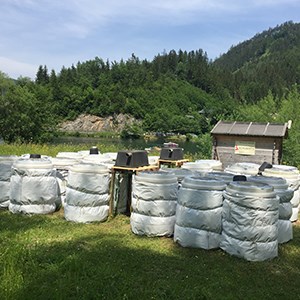Contact
Department of Aquatic Sciences and Assessment, Division of Ecology and Biodiversity
Department of Aquatic Sciences and Assessment, Division of Geochemistry and Hydrology

Two recently published studies suggest changes in lake ecosystems due to climate change processes. Climate change scenarios predict an increased average temperature in lakes. According to the recently published studies, this will change the lake food webs, resulting in lowered food quality.
Both studies show the effects of climate change processes in lake ecosystems, using different methods. One study used manipulated environments to test future scenarios of climate change, while the other study used data collected from subarctic and boreal lakes in the middle and north of Sweden.
Danny C.P Lau is affiliated with the Department of Aquatic Sciences and Assessment, Swedish University of Agricultural Sciences, and the main author of a publication (in Global Change Biology) describing the situation in the Swedish lakes. Researchers involved in this study assessed the fatty acid compositions of zooplankton and their microscopic food sources. As fatty acids support the growth and survival of animal and plant life by providing energy and by regulating immune systems, they are an indicator of the organisms' nutritional quality and the ecosystem’s wellbeing. The different lakes chosen for field sampling allowed the researchers to study variations between and within regions. It also allowed the researchers to determine the major environmental stressors that affect the nutritional quality of the lake food web. Results indicate that the nutritional quality of zooplankton decrease with a higher temperature and declining quantities of nitrogen relative to phosphorus of the lake water, while lake “browning” (discoloration due to increased dissolved organic material) may moderate the negative impacts of these stressors.
The findings of the experimental study are a collaboration of several researchers and conducted in the subalpine environment. The main author of its publication in Scientific Reports, is Pianpian Wu, Department of Aquatic Sciences and Assessment, Swedish University of Agricultural Sciences. The experimental study used modeling of climate change and tested the effects of warming and “browning”. To test the effects of warming and browning, the study used a manipulated environment, a “mesocosm”. The mesocosms were thermally insulated plastic cylinders placed outdoors. The researchers were able to produce different controlled conditions and test four different scenarios of weathering effects. The study looked at the fate of nutritious polyunsaturated fatty acids and toxic methylmercury in the food chain. Results show that a combination of warmer water and its “browning” caused the higher transfer of methylmercury from water to phytoplankton at the base of the food web, lowering nutrition value and increasing dietary risks.
Lau, D. P.C., Jonsson, A., Isles, P. D. F., Creed, I. F., Bergström, A.-K., Lowered nutritional quality of plankton caused by global environmental changes. Global Change Biology 27, 23 (2021). doi.org/10.1111/gcb.15887
Wu, P., Kainz, M.J., Valdés, F. et al. Elevated temperature and browning increase dietary methylmercury, but decrease essential fatty acids at the base of lake food webs. Scientific Reports 11, 16859 (2021). doi.org/10.1038/s41598-021-95742-9